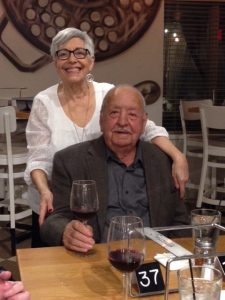Loreta Vitale

Have you ever been awakened by a phone call at 3 am and know that something serious has happened? On November 9, 2014, I awakened to such a phone call. It was my father, calling from Italy telling me that my mother was extremely ill. Mom had been treated with antibiotics in Italy for an infection in her gums. (Sepsis and Dental Health) The antibiotics were changed from shots to oral tablets on Saturday and by Sunday afternoon she was confused and febrile with at temp of 40 degrees C (104 degrees F). She refused to go to the hospital.
By Monday morning, she was faint and very hard to rouse. The blood pressure monitor they used at home did not register a systolic pressure greater than 60. My father had her emergently taken to a small hospital in their city where she was diagnosed as having leukemia. As a registered nurse with a doctoral degree who has conducted research regarding sepsis care, I knew based on the description that my mother was in septic shock.
Because leukemia was not treated at that first hospital, thankfully they moved her to a larger hospital in the province capital. At the second hospital they started antibiotics, 12 hours after she presented to the emergency room at the first hospital. She never received any of the care described in the Surviving Sepsis Guidelines- no fluid boluses, blood cultures, or lactate levels. Mom was transfused with 3 units of blood and required very high doses of oxygen, multiple IVs, and a Foley catheter. She was placed in isolation because of serious GI bacteria called clostridium difficile. (Sepsis and C. Difficile) Her chest X-ray also showed a pattern that would later be diagnosed as invasive pulmonary aspergillosis, a serious fungal infection with pneumonia.
Once I received the phone call, my family mobilized to get me to Italy. I did not even have an up-to-date passport. With the help of family, friends, and the compassionate people at the Detroit Passport Agency, my brother and I were on a plane by 930pm to Rome. When we arrived at the hospital, we found a much different medical culture. Because my mother was more than 70 years old, she was not being treated aggressively. She did not meet the admission criteria for ICU because of her age and diagnosis. Basic care such as hand washing upon entering and exiting the room was never done and no gloves were used. Many of the guidelines and nursing standards of care to which I am accustomed were never in place.
Her blood pressure and oxygen levels checked only each morning were dangerously low the entire time she was in the Italian hospital. My brother and I decided almost immediately to bring her home via air ambulance. It took us 4 days to arrange a flight and, with difficulty, obtain discharge from the Italian hospital. Mom and I flew home on a tiny Lear jet ambulance, stopping every 4 hours to refuel. Mom survived septic shock and went on to be treated for acute myeloid leukemia at a wonderful comprehensive cancer center, Karmanos Cancer Center. She was in remission for 1.5 years and recently successfully received a second course of chemo. She enjoys life every day and travels whenever possible. How and why she survived, I will never know. We count our blessings every day.
Source: Maria Teresa Palleschi (Loreta's daughter)






























